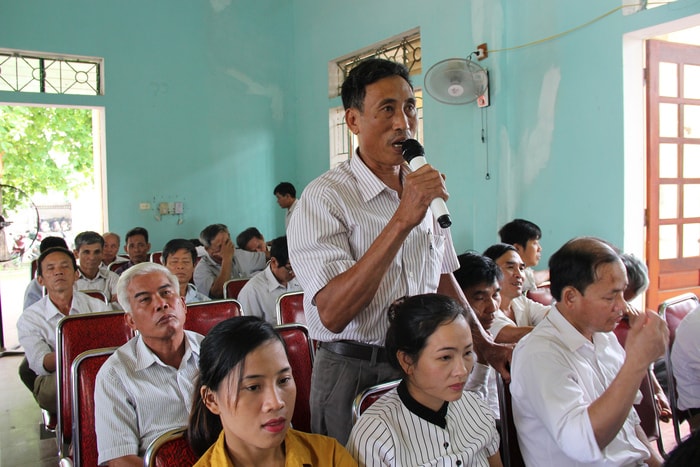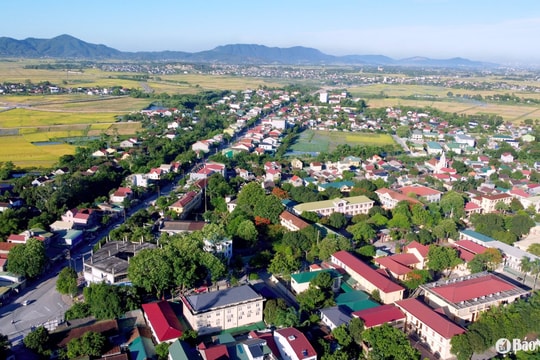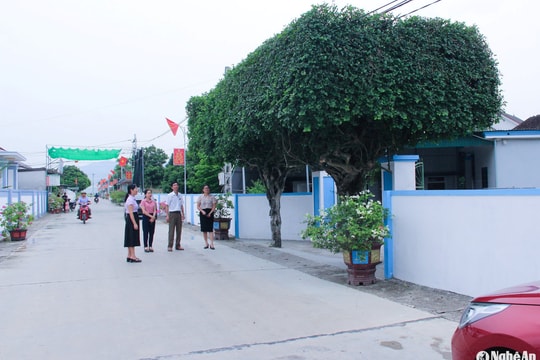Respect dialogue and thoroughly resolve people's issues
(Baonghean) - The organization of dialogue with the people has been implemented by Nam Dan district since 2013 according to Decision No. 2924/QD-TU, dated August 30, 2012 on promulgating the Regulations on dialogue with the people. However, in practice, previous dialogues were often similar to voter contact activities, and the opinions expressed by the people were assigned to the district-level departments and offices to resolve and respond.
Since 2016, this activity has been innovated, with the guiding view being to commit to the people a specific time to resolve the petitions. Instead of a general dialogue between the district level and the heads of the mass mobilization groups of the blocks and hamlets, it has now shifted to a direct dialogue between the Standing Committee of the Commune Party Committee and the people, with the participation of the Standing Committee of the District Party Committee and the district-level departments and offices. Accordingly, the two communes of Nam Phuc and Nam Tan have been organized to have dialogues with the people.
 |
| Strengthening dialogue and resolving people's issues in Nam Trung commune. Photo: Minh Chi |
In Nam Phuc commune, dialogue work is organized regularly, through which the Party Committee and government both thoroughly explain issues and do a good job of mass mobilization.
Secretary of the Nam Phuc Commune Party Committee, comrade Nguyen Van Dao, shared: At the dialogue, many opinions of the people were directly and thoroughly answered by local and district leaders, helping people understand and agree better, especially on policy issues.
Through dialogue, grassroots Party committees and authorities also see more clearly the limitations and shortcomings in their leadership, direction and administration that need to be adjusted and lessons learned.
For example, in mobilizing internal resources to build new rural areas, due to inappropriate propaganda and mobilization methods, people still rely on and expect investment from the State.
On the other hand, because the mobilization method is diplomatic to the hamlets, and the hamlets allocate it per capita, people do not agree to contribute to building rural roads.
After the dialogue, people clearly understood their responsibilities, which was the people's responsibility and which was the State's responsibility in building new rural areas; at the same time, the commune also innovated the mobilization method based on people discussing to mobilize households in the hamlet or mobilize households along the roads to concentrate on work.
Thanks to that, nearly 1 year after the dialogue, Nam Phuc commune mobilized people to build 11 km of concrete road, and at the same time contributed to upgrading and investing in synchronous cultural institutions for the hamlet cultural houses...
In Nam Tan commune, the dialogues recorded dozens of opinions expressed by the people. Typically, recently, the dialogue between the commune and the people had 40 opinions from the people on many fields. Comrade Pham Van Khanh - Secretary of the Commune Party Committee, said: In the dialogue, the commune classified each issue, in which the authority at the commune level was 21 opinions, the district level was 19 opinions.
Accordingly, the Standing Committee of the Commune Party Committee and the district-level departments, agencies, and branches, together with the Standing Committee of the District Party Committee, directly answered the issues according to their authority. As a result, about 80% of opinions were answered thoroughly, with consensus from officials and people, and 20% of opinions needed time and a roadmap to resolve.
In particular, awareness of responsibility of commune-level officials and civil servants is also raised, thereby enhancing learning and improving capacity and professional qualifications to better fulfill assigned tasks.
Sharing initial experience in dialogue with communes, comrade Le Thi Hang - Head of the Mass Mobilization Committee of Nam Dan District Party Committee, said: Choosing the dialogue subjects as the District Party Committee Standing Committee and the grassroots Party Committee Standing Committee is aimed at expanding the content and scope of dialogue, while ensuring quality dialogue, solving many problems that arise in practice.
Because if only the Party Committee Secretary conducts dialogue, it will be difficult to answer and resolve issues under the State's authority, or if the People's Committee Chairman conducts dialogue, issues related to Party building and personnel work will also be more difficult.
On the other hand, attention is also paid to the selection of facilities to organize dialogues, which are facilities with difficulties in personnel work or problems and difficulties that need to be resolved through dialogue to find the causes and propose solutions.
In order to conduct a substantive dialogue and thoroughly resolve practical issues, in addition to the issues answered and resolved directly at the dialogue, the Standing Committee of the District Party Committee assigned the District Party Committee's Mass Mobilization Committee and the District Party Committee Office, and the District People's Committee Office to continue monitoring and urging departments, branches, sectors and localities to resolve them.
Also according to comrade Le Thi Hang, from the success and positive feedback from cadres and people through dialogue in the two communes of Nam Phuc and Nam Tan, in 2017, the policy of the Standing Committee of the District Party Committee will be to directly dialogue in the two communes of Nam Linh (scheduled for August 11) and Nam Thuong (scheduled for August 16).
At the same time, direct the Standing Committees of the Party Committees of the remaining 22 communes and towns to develop plans to directly dialogue with the people and have the participation of the Standing Committee members of the District Party Committee in charge of the region and the Party Committee members in charge of the points, along with leaders of the district-level departments and offices.
Minh Chi



